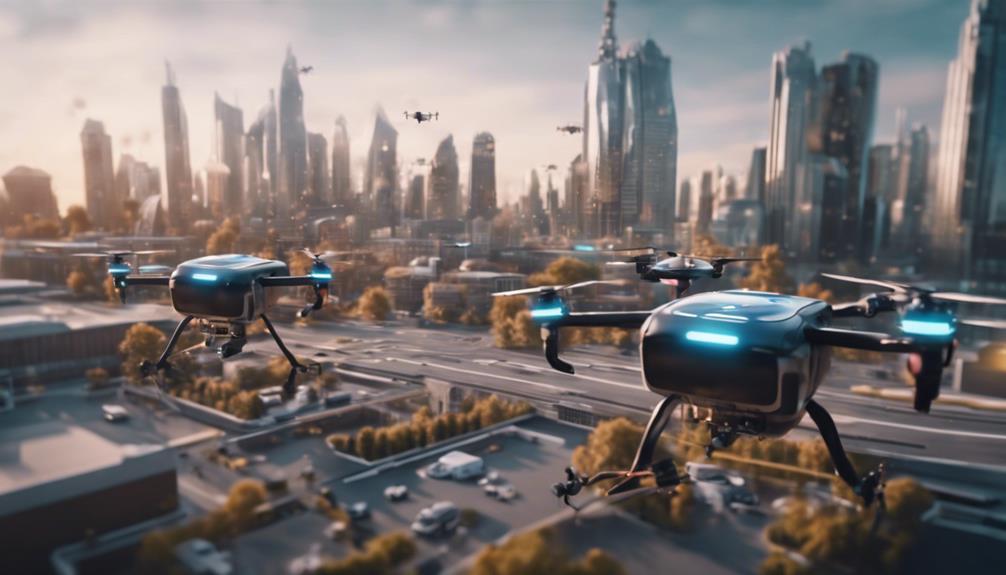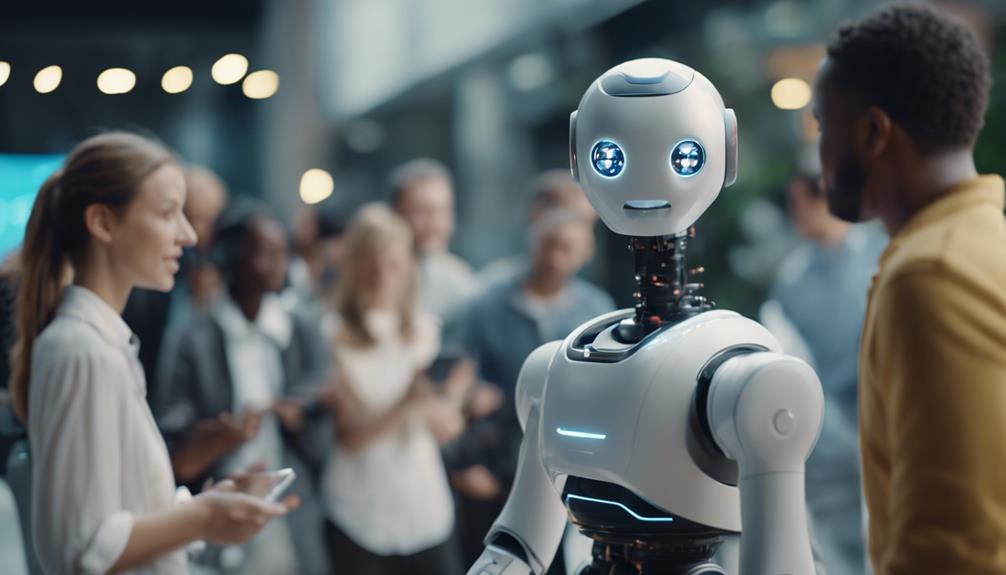Artificial Intelligence in Ta’if
AI Applications in Various Industries in Ta’if

Evolution of Artificial Intelligence Techniques
How have artificial intelligence methods evolved over time to shape modern technological advancements?The journey of AI methods began with symbolic approaches and problem-solving techniques in the 1950s, laying the foundation for the development of advanced algorithms. DARPA's involvement in street mapping projects during the 1970s marked significant progress in applying AI practically. Over the years, AI has shifted from basic problem-solving to more complex tasks like pattern recognition, driven by continuous research and technological innovations.One of the key advancements in AI methods has been the rise of machine learning algorithms, particularly neural networks. This evolution has led to the emergence of deep learning, a subset of machine learning that focuses on training data to enhance decision-making processes. Additionally, AI methods now include computer vision for image recognition and unsupervised learning for identifying patterns without labeled data. The fusion of these methods has propelled AI to new heights, enabling it to tackle a wide array of tasks efficiently and effectively.Impact of AI on Society in Ta’if

Ethical Considerations in Artificial Intelligence
Considering the intricate interplay between technology and ethics, examining the ethical implications of artificial intelligence (AI) is paramount in shaping a responsible and equitable future. Ethical considerations in AI encompass a range of critical issues. Bias in algorithms is a significant concern, as it can lead to discriminatory outcomes in decision-making processes.Transparency in AI systems is vital to understand how decisions are reached and guarantee accountability for ethical standards. Data privacy is another key aspect, with worries about the security and consent surrounding the collection and utilization of personal data in AI applications.Fairness and equity in AI implementation involve tackling societal biases and ensuring just outcomes for all individuals affected by AI technologies. To address these concerns, ethical AI frameworks and guidelines are being developed to promote responsible AI practices and mitigate potential harm to society and individuals.It is imperative to navigate these challenges thoughtfully to foster a future where AI operates ethically and equitably.Future of AI and Superintelligence

Frequently Asked Questions
What Are 4 Types of Artificial Intelligence?
The four types of artificial intelligence include Weak AI, focused on specific tasks; Strong AI or artificial general intelligence (AGI), aiming for human-like cognitive abilities; Artificial super intelligence (ASI) surpassing human intelligence; and Machine learning enabling systems to learn autonomously.How Is AI Being Used Today?
AI is revolutionizing various sectors like healthcare, finance, transportation, customer service, and agriculture. It aids in diagnosing diseases, fraud detection, autonomous vehicle navigation, chatbots for customer service, and precision farming. AI applications continue to enhance efficiency and innovation across industries.Can You Explain Artificial Intelligence?
Artificial intelligence demonstrates the emulation of human cognitive processes by machines. It encompasses tasks like problem-solving, learning from data, and applying knowledge to automate functions. AI's evolution and significance span various sectors, enhancing efficiency and innovation.What Is 1 Example of Artificial Intelligence?
One prominent example of advanced technology is IBM's Watson, known for utilizing natural language processing and machine learning to analyze data and offer valuable insights. This cutting-edge system showcases the power of innovation in data analysis and decision-making processes.Ta’if Artificial Intelligence: Revolutionizing Technology in Saudi Arabia
Artificial Intelligence (AI) has been rapidly advancing across the globe, and Ta’if, a city located in Saudi Arabia, is at the forefront of this technological revolution. With the increasing demand for AI-driven solutions, Ta’if has been making significant strides in the development and implementation of AI technology.
One of the key areas where Ta’if has been leveraging AI is in healthcare. The integration of AI has allowed for the development of advanced diagnostic tools, personalized treatment plans, and predictive analytics, ultimately improving patient outcomes and the overall efficiency of the healthcare system in the region. Additionally, AI has played a crucial role in optimizing resource allocation and management in hospitals and clinics.
In the field of transportation, Ta’if has been utilizing AI to enhance traffic management, improve public transportation systems, and develop autonomous vehicles. These advancements have not only contributed to a more sustainable and efficient urban environment but have also improved the overall safety and convenience of transportation for residents and visitors alike.
Moreover, in the realm of business and industry, AI has been instrumental in driving innovation, streamlining processes, and increasing productivity. From automation and robotics to algorithmic trading and customer service chatbots, AI has revolutionized the way businesses operate in Ta’if, leading to improved competitiveness and economic growth in the region.
In conclusion, Ta’if’s embrace of Artificial Intelligence has positioned the city as a leader in technological advancement within Saudi Arabia. As AI continues to evolve and permeate various sectors, Ta’if is poised to remain at the forefront of this transformative wave, driving positive societal and economic change for the region. The integration of AI holds great promise for the future and will continue to shape the landscape of Ta’if for years to come.
Other Services in Ta’if
Taif (Arabic: اَلطَّائِفُ, romanized: al-Taif, lit. ‘The circulated or encircled’, Hejazi Arabic pronunciation: [atˤˈ tˤaː(j)ɪf]) is a city and governorate in the Mecca Province of Saudi Arabia. Located at an elevation of 1,879 m (6,165 ft) in the slopes of the Hijaz Mountains, which themselves are part of the Sarat Mountains, the city has a population of 563,282 people in 2022, making it one of the most populous city in the kingdom.
There is a belief that Taif is indirectly referred to in Quran 43:31. The city was visited by the Islamic prophet Muhammad, sometime in the early 7th century, and was inhabited by the tribe of Banu Thaqif. It is still inhabited to this day by their descendants. As a part of the Hejaz, the city has seen many transfers-of-power throughout its history, with the last being during the Saudi conquest of Hejaz in 1925.
The city has been called the unofficial summer capital of Saudi Arabia and has also been called the best summer destination in Saudi Arabia as it enjoys a moderate weather during summer, unlike most of the Arabian Peninsula. The city owes its popularity among tourists to its many mountain resorts and moderate climate, even during the harsh summers of Arabia. The city is connected to the nearby resort town of Al-Hada via the iconic Highway 15 (Taif – Al-Hada Road). It stands out from the rest of the Hijazi region as it is a city that plays an active role in the agricultural output of Saudi Arabia and is the center of an agricultural area known for its cultivation of grapes, pomegranate, figs, roses and honey. Taif is also very active in the manufacturing of traditional attar, and is known locally as “City of the Roses” (Arabic: مَدِيْنَة ٱلْوُرُوْد, romanized: Madīnat al-Wurūd). Taif also hosts the historic Souq ‘Okaz.
The Taif governorate is divided into 15 smaller municipalities, with Ta’if as the capital. The administration of the city itself is carried out by five municipalities, named North Taif, West Taif, East Taif, South Taif and New Taif. Taif is served by the Taif Regional Airport, with a new international airport planned to open sometime in 2020.
